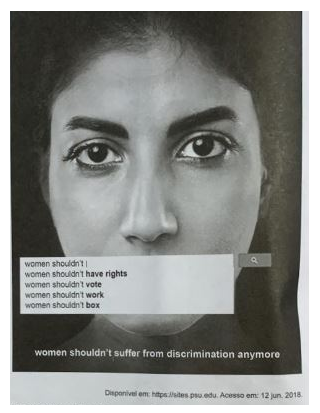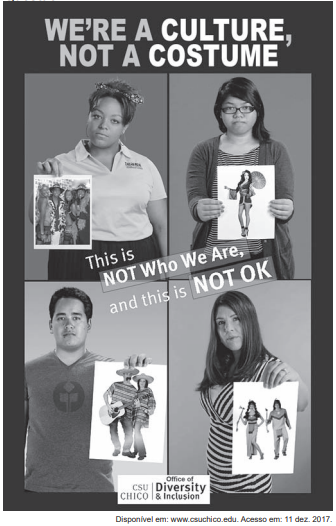Os recursos usados nesse pôster de divulgação de uma campanha levam o leitor a refletir sobre a necessidade de
A Mother in a Refugee Camp
No Madonna and Child could touch
Her tenderness for a son
She soon would have to forget...
The air was heavy with odors of diarrhea,
Of unwashed children with washed-out ribs
And dried-up bottoms waddling in labored steps
Behind blown-empty bellies. Other mothers there
Had long ceased to care, but not this one:
She held a ghost-smile between her teeth,
and in her eyes the memory
Of a mother’s pride... She had bathed him
And rubbed him down with bare palms.
She took from their bundle of possessions
A broken comb and combed
The rust-colored hair left on his skull
And then — humming in her eyes — began carefully
[to part it.
In their former life this was perhaps
A little daily act of no consequence
Before his breakfast and school; now she did it
Like putting flowers on a tiny grave.
ACHEBE, C. Collected Poems. New York: Anchor Books, 2004.
O escritor nigeriano Chinua Achebe traz uma reflexão sobre a situação dos refugiados em um cenário pós-guerra civil em seu país. Essa reflexão é construída no poema por meio da representação de uma mãe, explorando a(s)
Finally, Aisha finished with her customer and asked what colour Ifemelu wanted for her hair attachments.
“Colour four.”
“Not good colour,” Aisha said promptly.
“That’s what I use.”
“It look dirty. You don’t want colour one?”
“Colour one is too black, it looks fake,” Ifemelu said, loosening her headwrap. “Sometimes I use colour two, but colour four is closest to my natural colour.”
[...]
She touched Ifemelu’s hair. “Why you don’t have relaxer?”
“I like my hair the way God made it.”
“But how you comb it? Hard to comb,” Aisha said.
Ifemelu had brought her own comb. She gently combed her hair, dense, soft and tightly coiled, until it framed her head like a halo. “It’s not hard to comb if you moisturize it properly,” she said, slipping into the coaxing tone of the proselytizer that she used whenever she was trying to convince other black women about the merits of wearing their hair natural. Aisha snorted; she clearly could not understand why anybody would choose to suffer through combing natural hair, instead of simply relaxing it. She sectioned out Ifemelu’s hair, plucked a little attachment from the pile on the table and began deftly to twist.
ADICHIE, C. Americanah: A novel. New York: Anchor Books, 2013.
A passagem do romance da escritora nigeriana traz um diálogo entre duas mulheres negras: a cabeleireira, Aisha, e a cliente, Ifemelu. O posicionamento da cliente é sustentado por argumentos que
Nesse pôster de divulgação de uma campanha que aborda a diversidade e a inclusão, a interação dos elementos verbais e não verbais faz referência ao ato de
A Minor Bird
I have wished a bird would fly away,
And not sing by my house all day;
Have clapped my hands at him from the door
When it seemed as if I could bear no more.
The fault must partly have been in me.
The bird was not to blame for his key.
And of course there must be something wrong
In wanting to silence any song.
FROST, R. West-running Brook. New York: Henry Holt and Company, 1928
No poema de Robert Frost, as palavras “fault” e “blame” revelam por parte do eu lírico uma



